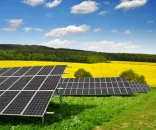
Uprising against nuke plants spreads in India
Nuclear opposition in India has remained resilient in the months since the devastation at Japan's Fukushima nuclear plant.
In one of the latest signs of the movement's strength, the elected heads of governments of the eastern states of West Bengal and Tamil Nadu—who are both leaders of powerful regional parties—have recently reversed support for nuclear megaprojects in their states.
West Bengal Chief Minister Mamta Banerjee, who once backed the building of a Russian-built, 6,000-megawatt nuclear facility in the coastal fishing village of Haripur, told the central government in August the state is scrapping the long-opposed project in the face of mounting resistance.
In Tamil Nadu, Chief Minister J. Jayalalithaa recently had her own u-turn on plans to add six reactors to the Koodankulam Nuclear Power Plant. The plant already has two reactors constructed, though not yet operating, using Russian technology that was available to India long before the Indo-U.S. deal.
In a letter last month to Prime Minister Manmohan Singh, Jayalalithaa urged the government to put the expansion on hold until local concerns were addressed. She passed a resolution in the provincial legislature seeking the same goal. People have been "agonized, disturbed and gripped by a fear psychosis due to the scope and magnitude of the issue in the wake of the Fukushima mishap," Jayalalithaa wrote to Singh. The project would be roughly double the size of of the Fukushima complex.
"Fukushima has greatly helped our agitation," said activist S.P. Udayakumar in an interview. For 20 years, Udayakumar has led the People's Movement Against Nuclear Energy, a campaign against the Koodankulam project, which was initiated in 1988.
Similarly, opposition is growing against the 9,900-megawatt Jaitapur Nuclear Power Project in the state of Maharashtra on the western coast, to be built by French power developer Areva SA. Because Maharashtra is led by the Indian National Congress Party, which also heads the government of India, the state government cannot oppose the project.
In West Bengal and Tamil Nadu, the decision by state government heads to pull support for the nuclear projects may seem surprising, given the amount of electricity the plants would supply. Some 40 percent of Indians, about a half a billion people, still lack power. Further, the central government is required to cover the full, enormous cost of each nuclear facility. The plant at Jaitapur, for instance, would cost upwards of $12 billion.
The full story is available at Reuters.













 Advertise
Advertise











